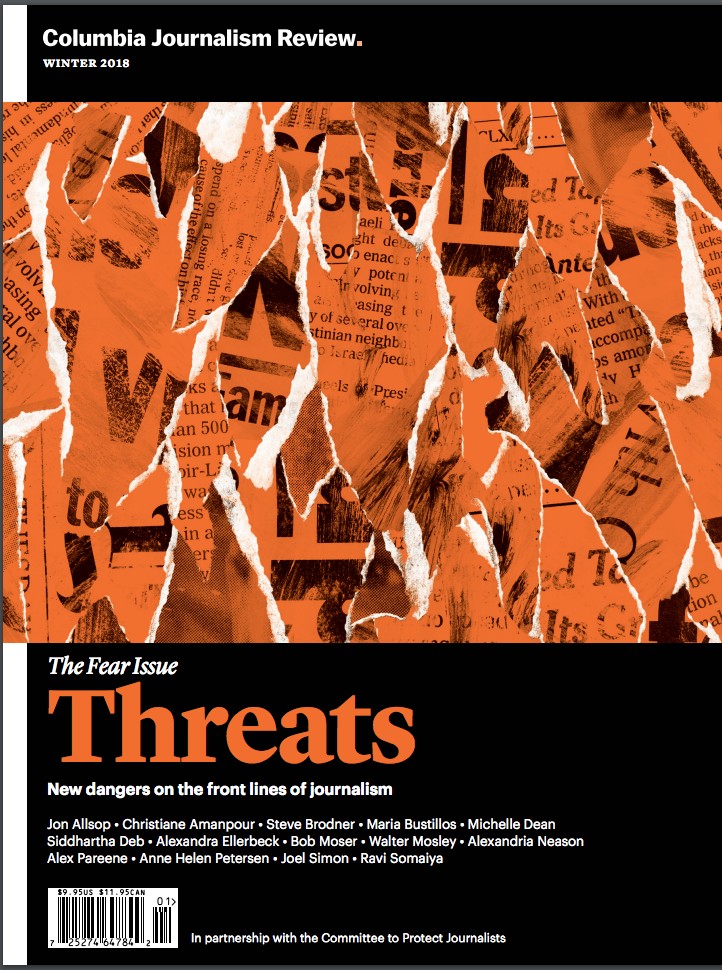“Journalism is under threat,” CJR Editor and Publisher Kyle Pope writes in the opening pages of our newest print issue. “The president of the United States is undercutting us, autocrats around the world are cracking down on us, police and the courts are moving against us.”
We’ve grown used to stories about journalists struggling to do their work in countries whose leaders don’t respect the value of a free press, and, over the past year, much has been written about Donald Trump’s attacks on the media contributing to a lack of public trust at home. But Pope writes that the threats to journalism go far beyond those familiar topics. “Not only are the dangers faced by reporters growing and morphing daily,” he writes, “but the nature of the threats we face is, quite frankly, more wide-ranging and fundamental than I ever would have imagined.”

From billionaires with the power to bring down entire news outlets to non-disclosure agreements that prevent journalists from informing the public, practicing journalism in 2018 is perhaps tougher than it has ever been. CJR’s new issue, published in partnership with the Committee to Protect Journalists and out today, explores those issues and more. Contributors for the issue include, among others, Christiane Amanpour, Maria Bustillos, Michelle Dean, Siddhartha Deb, Walter Mosley, Alex Pareene, Anne Helen Petersen, and Michael Rosenwald.
We’ll be rolling out more pieces as in the next two weeks, and we’d love for you to spend some time with the issue as it publishes online. If you’re not already a member, we’d be grateful for your support—$50 gets you a year of access to exclusive content, four issues of the print magazine, and invitations to CJR events.
Below, the first few pieces we’ve already made available online.
- The president’s phantom threats: Donald Trump has so far has failed to follow through on his promised press assault. But CPJ’s Joel Simon and Alexandra Ellerbeck write that journalists shouldn’t get complacent. Noting Jeff Sessions’s testimony regarding 27 open leak investigations, Simon and Ellerbeck write that it’s too soon to think we’re in the clear.
- The burnout year: CJR Senior Staff Writer Alexandria Neason writes on the psychological and physical toll of burnout, particularly for reporters of color working at a time when racist language permeates our news feeds.
- One Dangerous Year: Looking at 2017 by the numbers, Christie Chisholm, Denise Southwood, and Alexandra Ellerbeck have a depressing set of infographics cataloging the jailing, attacks, and killings of journalists in the US and around the world.
- Erasing history: Maria Bustillos takes on the new battle over journalism’s digital legacy. With the shift to digital publishing, there was an assumption that the journalistic record would live on forever. But Bustillos writes that new digital records have degraded even more quickly than did newsprint.
Other notable stories
- Wired’s cover story looks at the two years that shook Facebook. Nicholas Thompson and Fred Vogelstein spoke with dozens of current and former Facebook employees, and the result is worth your time.
- CJR’s Meg Dalton gets the story behind the Dallas Morning News’s excellent investigation of the July 7, 2016 shooting of police officers in Dallas.
- Cuts are coming to CNN’s digital operation, reports Vanity Fair’s Joe Pompeo. With as many as 50 layoffs expected, Pompeo writes that “despite the so-called Trump Bump, CNN appears to be re-thinking at least some elements of its digital strategy.”
- The Washington Post is continuing its international expansion, opening bureaus in Rome in Hong Kong, according to a press release. The move signals a continued revitalization of the paper under owner Jeff Bezos and EIC Marty Baron. The Post will also add a second Mexico City correspondent, bringing its total number of foreign reporters to 27.
- With the Pyeongchang Olympics underway, I looked at how the Games provide an opportunity for journalists to avoid sticking to sports. “The Olympics are kind of about everything,” Sports Illustrated’s Richard Deitsch told me. “They’re about gender, they’re about race, they’re about politics, they’re about economics, and they’re about sport.”


